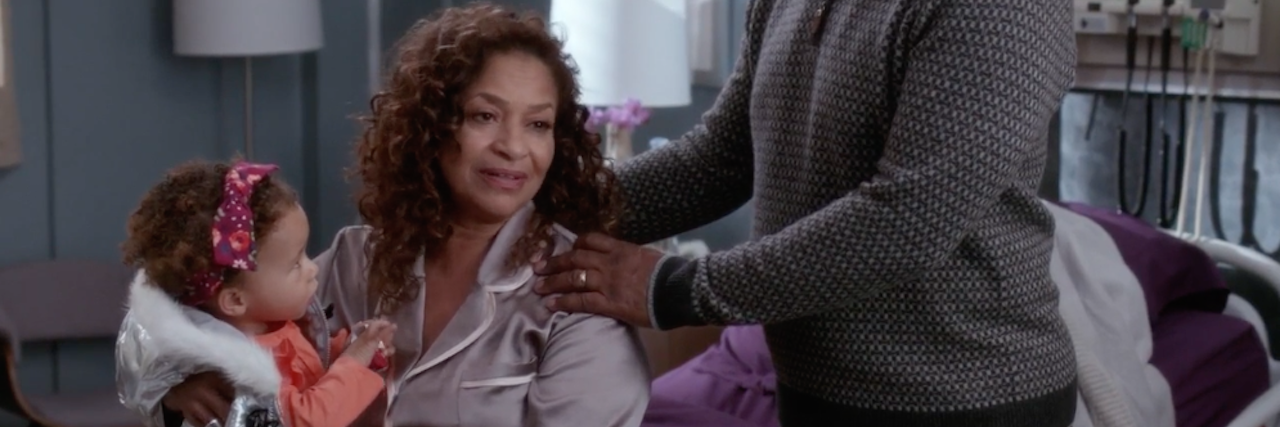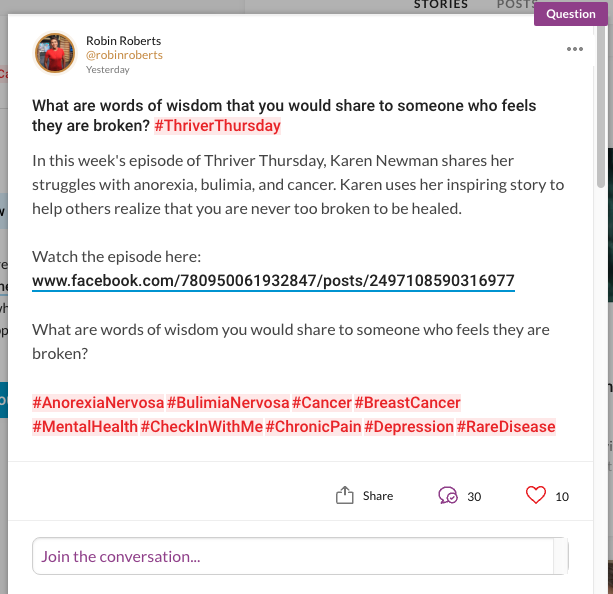'Grey's Anatomy' Portrays the Reality of 'Chronic Cancer' No One Talks About
Despite the language that is typically used to talk about cancer, cancer isn’t necessarily about “winning” and “losing” — there’s often a gray area in between, where people live their lives while still dealing with chronic cancer. “Grey’s Anatomy” writer and producer Elisabeth Finch is currently living with long-term cancer. In an essay for The Hollywood Reporter, she revealed she wrote Thursday’s episode to bring attention to the “non-binary” version of cancer that’s rarely shown.
In her essay, Finch explained that she has been living with chondrosarcoma, a rare form of bone cancer, for six years. After she mentioned in the “Grey’s Anatomy” writers room that she didn’t know what “winning” and “losing” with cancer looked like, showrunner Krista Vernoff asked if she wanted to write an episode about her cancer experience.
Share words of support for others dealing with cancer.
Answer Robin Roberts’ question now:
She ultimately decided to take her up on the offer because she is the only person on the writing staff who identifies as a person with a disability. Finch said she used the opportunity to portray the side of cancer that isn’t “dead” or “cured”:
Scientists around the world are finding new ways to keep people with metastatic cancer alive — not by curing it, but managing it long-term. (Think diabetics on insulin.) I am one of those people. I may live with cancer the rest of my life. Because it’s a chronic condition, I identify as a person with a disability. I have a full life of work and friendship and love and travel and failure and joy. But I’ve never seen that version of cancer, that version of ability on television.
In the episode, two characters are dealing with cancer: Catherine (played by Debbie Allen), who is having surgery to remove her tumor and is based on Finch, and Thatcher (Jeff Perry), who has decided to forgo any further treatment for his cancer.
Catherine’s surgeons are determined to remove all of her tumor, but end up removing 95 percent, meaning she’ll still have cancer for the rest of her life. But Finch chose to portray her as grateful for the outcome: she’s happy to be alive and celebrating, rather than being disappointed as most representations would have shown her.
“That’s how I feel every damn day,” Finch wrote. “I’m thrown in MRI machines regularly and I sing ‘Sloop John B.’ to keep myself calm the way Catherine sang ‘Ain’t No Mountain High Enough’ — and then I go to work. And Catherine will, too.”
There’s a whole community out there who understands what you’re going through. Download the free Mighty app to get support from other people with cancer.
For Thatcher, Finch said she wanted him to show a version of cancer where someone didn’t have to carry anyone’s burden of “fighting to the end.” Instead, he died comfortably with no one judging his choice.
Watching Allen portray Catherine onscreen was a powerful moment for Finch.
“For the first time, I saw my story reflected back at me. I saw a version of ability, a version of cancer that looked like mine, like my other friends living with cancer,” she wrote.
Other people with cancer have spoken out against the “battle” language often used to talk about and conceptualize cancer, like “conquer,” “defeat,” “brave,” and “warrior.” Mighty contributor Siobhan Hebron wrote an essay critiquing this kind of language and the toxic masculinity it represents.
She wrote:
The word choice implies a finality, a need to define the relationship in terms of “win” or “lose,” when illness rarely works like that. I believe that the language conveys an active discomfort with a more feminine approach of not needing to “conquer” or “defeat” illness, but instead being able to exist in tandem. Not only does it not give credit to the process, but it completely negates the life of the living, breathing person, the give and take they experience actually living with an illness.


